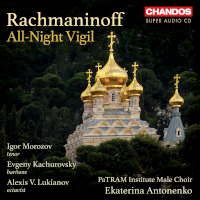Review by William Kempster
RACHMANINOFF
All-Night Vigil,
op. 37 (arr. Gretchaninoff/Lazarev/Sheehan)
•
Ekaterina Antonenko, cond; Igor Morozov (ten); Evgeny Kachurovsky
(bar); Alexis V. Lukianov (bs); PaTRAM Institute Male Ch
•
CHANDOS 5349 (SACD: 70:13  )
)
Sergei Rachmaninoff’s All-Night Vigil—or as it is more often referred to in choral circles, the Vespers—is undoubtedly one of the true masterworks for unaccompanied choir. While all 15 movements are rarely performed consecutively except by professional-level choirs, numerous of the movements can stand alone or in shorter couplings and be well within the reach of a good amateur chorus. This is how numerous of these choral gems, and especially the sixth movement, “Bogoróditse Dévo” (Rejoice, O Virgin), have become widely known and performed, even in the West. I myself have conducted the complete work on two occasions, but I have never heard it done with male voices alone, so this release was of particular interest, especially on account of the fact that I was hugely impressed with PaTRAM’s previous release, More Honourable than the Cherubim.
It should be understood that many of the movements as presented here are, strictly speaking, arrangements of Rachmaninoff’s original, which was written for mixed voices. The term “arrangement,” however, is perhaps a bit misleading in some cases, as the arrangers have tried to preserve the original textures as best they could, with Gretchaninoff’s single contribution, for example, pretty much presenting the seventh movement transposed (rather than truly “arranged”) down a fifth. Even where Rachmaninoff’s original pitches have been retained—and some true “arranging” has therefore been undertaken—the results are always convincing, and the performance as a whole sounds like a rendition of the original and not an arrangement of it.
As was the case with More Honourable than the Cherubim, the singing on this recording is simply outstanding. There is not another choir on the planet whose sound could be in any way compared to this, especially featuring as it does the extraordinary sonorities produced by having no fewer than eight oktavists (basso profundo singers capable of singing nearly an octave lower than would normally be expected from singers designated as basses) in the ensemble.
Right from the start, this performance stands out from others as the opening number is preceded by chant, firstly in the ultra-low register, then in the tenor register. Immediately the oktavists make their presence felt, and the sound is extraordinary. The outstanding SACD multichannel recording places the choir at a believable distance so that the full sonorities produced can be readily appreciated, with the rear channels contributing greatly to the sense of space in the recording.
The second of these pieces, “Bless the Lord, O My Soul,” was originally scored for alto solo and chorus, and in this movement I do miss the somewhat greater vulnerability I feel that the original scoring brings to the music. The baritone soloist sings perfectly well here, but his sound for me is too robust and within too comfortable a range. In the third setting, however, it seems to me that this version adds even more pathos and awe to the music than was observable in the original scoring. Here the low basses are truly amazing in the repeated refrain of “Aliluya.” I doubt anyone who has not yet listened to this recording will have ever have heard anything quite like it.
Rather than continue to proceed through comments on every movement, I think the reader will already understand that this is a very special release, so I will limit further comments to a few observations. While every performance on this recording features extraordinary singing, I would have liked to have heard an even greater dynamic range from this choir, as the members surely are capable of such. In fact the issue of dynamics is one that might interest some particular devotees of this repertoire. As far as I am aware, the edition of Rachmaninoff’s complete Sacred Choral Works, edited by Vladimir Morosan, and published in 1994 by Musica Russica, presents the definitive edition of this music. In terms of adherence to dynamic markings in particular, however, this performance does not seem to be particularly diligent in according with the composer’s wishes. In number seven (the Gretchaninoff “arrangement”), for example, the original score has three different dynamic markings notated in the first five measures: mezzo-forte, piano, and pianissimo. In PaTRAM’s performance, however, these are not observed. Was this Gretchaninoff’s decision, or the conductor’s? Further, all of the entries on triads set to the two syllables of “Slá-va” are marked, respectively, with an accent and a tenuto marking. PaTRAM don’t observe these either. If one goes through the Musica Russica score in full (as I did) while listening to these performances, it is consistently the case that this performance does not follow exactly what the composer seems to have written. Does this matter? Some would say yes, others would never even know. Would it matter to the casual nonexpert listener? Absolutely not! It has to be said, however, that the famous recording by the USSR Ministry of Culture Chamber Choir, under the direction of Valeri Polyansky, is far more faithful to the composer’s score than PaTRAM is in this performance.
On the plus side, however, it is gratifying to report that this performance does the famous sixth movement as it is said the composer wanted it done, with no audible breathing breaks taken before the marked rest in measure 25. In my opinion the tempo taken here is a little inflexible, and more could have been done to combine flexibility of tempo with gradation of dynamics as well. Listening to this in comparison with the USSR’s performance is enlightening in this regard.
Hearing this performance of Rachmaninoff’s All-Night Vigil is an experience not to be missed, however, and in terms of the recording itself this new version by PaTRAM is clearly far and away the finest ever made. I personally believe that Polyansky’s recording (mentioned above) still remains untouched as the greatest this work has ever received, but it is hard to find a good pressing of this, as in many I have heard the recording itself is hopelessly compressed and clips frequently (that said, the pressing published by Moscow Studio Archives is free from these problems, if you can find it). That recording from 1986 is for me more idiomatic and more nuanced—particularly in terms of both dynamics and tempo—than this new one, and no one who loves this music should be without it! That said, for a variety of reasons, not least the unbelievable standard of singing on this new recording, no one should be without this one either. William Kempster






















